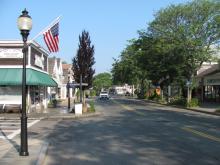
Fast, affordable Internet access for all.

Cape Cod, a peninsula in southeastern Massachusetts that juts out into the Atlantic Ocean like a flexed arm, has long been known as a top summer vacation destination and upscale retirement haven going back to when JFK launched his Presidential campaign from his family’s Hyannisport homestead.
During the height of the summer tourist season the population swells to over a million people as visitors from all over the world come to enjoy its picturesque beaches as well as its trails, shops, and seafood. And while the region’s economy is reliant on tourism, the Cape is home to 250,000 year-round residents spread out across 1,306 square miles in 15 towns, many of whom would like to see the regional economy become more diversified, even if the decades-old vision of transforming it into the “silicon sandbar” remains a pipe dream.
What members of a fledgling citizens group in the town of Falmouth have in mind may not be as grandiose as a “silicon sandbar,” but this week they got evidence that their vision of building a municipal-owned Fiber-to-the-Home (FTTH) network is no pipe dream.
Falmouth Feasibility Study
In the summer of 2019, David Isenberg – a longtime Falmouth resident, a former Bell Labs scientist, and Senior Advisor to the FCC’s National Broadband Plan – along with a handful of other residents formed the citizens group pushing for a FTTH network in Falmouth. They went before the town’s Economic Development and Industrial Corporation (EDIC) to lay out their vision. The group noted that Falmouth, the second-largest town on Cape Cod with a population of about 30,000 year-round residents, could do what 16 other Off-Cape Massachusetts towns have done – build a locally-controlled Internet access network. Then and there, Falmouth EDIC approved $50,000 for the study, concluding that “all sectors of Falmouth’s economy require reliable, high-speed Internet service.”
The results of the study conducted by CCG Consultants were released this week. The study found that more than 60% of residents and many businesses would subscribe, and that it would be financially feasible to build and operate the envisioned network.
“This new fiber network would eliminate the slowdowns and interruptions in [I]nternet service that many homes experienced during the pandemic,” the study noted. “It will also have the capacity to accommodate future growth for broadband services as more people work from home on the Cape; as business demand for uploading data continues; and as health care providers, schools, and community institutions continue to provide more [I]nternet-based services in a post-pandemic world.”
The report also included key findings from a survey conducted by CCG before the COVID-19 pandemic:
Painting the Financial Picture
The thorough 216-page study also examined various financing options. While it found that an open access model would not be profitable for the town, the study says, a public-private partnership could succeed where the town builds the network with a private ISP partner. The study also said it would be feasible for Falmouth to operate a fiber ISP on its own with revenue bond funding that would break even with a 48% penetration rate or with a bank financing at a 42% penetration rate.
As it relates to debt financing, the study described the debt needed to finance the network as “significant.”
“If the town financed the business with bonds the needed bond financing would be in the range of $70 million. Traditional commercial bank financing would require almost $8 million in equity and loans of approximately $55 million,” the study says.

One possible way the town could save on construction costs, the study notes, is by sharing fiber with OpenCape, the non-profit who built the region’s middle-mile fiber network and is currently providing fiber broadband service to the town’s larger businesses, anchor institutions, and the downtown business district.
As the town weighs its options, members of a citizens group met with two as-of-yet-unnamed vendors who are willing to build the network with their own construction capital.
Currently, Falmouth residents have the duopoly option of Comcast and Verizon DSL. Verizon’s high-speed service, FiOS, doesn’t cross the Cape Cod Canal, which is why most Cape residents go with Comcast, whose service is expensive and too often unreliable.
“We’ve known for years we are getting second-rate broadband on Cape Cod,” Isenberg says. “The network here is not reliable. It’s worse in the summertime and really bad on a rainy day, especially when people stay home and watch Netflix.”
“We need reliable high-speed service, not just to handle summer visitors, but to support the year round population and local small businesses. We also have a lot of scientists who work from home and have big data requirements,” Isenberg notes, referring to Falmouth being home to a world-class marine science community, which includes the Woods Hole Oceanographic Institution and the Marine Biological Laboratory.
With several other Cape town’s watching closely, Falmouth now has the opportunity to lead the way on Cape Cod in bridging the region’s digital divide, boosting the local economy, and raising the standard of living.
The study identified several next steps, the most important of which are, 1) to decide if the town wants such a network and 2) educate the public on the network’s advantages.
Isenberg says, “if the people of Falmouth decide they want this (FTTH) network, the rest will be easy.”

